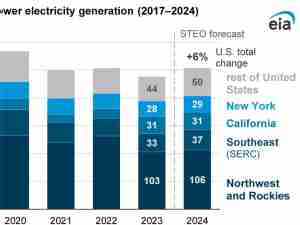No fix for Egypt’s LNG needs as search for terminal widens
By: Reuters | Jul 10 2014 at 08:31 AM
Egypt has missed a window to avert gas shortages this year as plans to secure a floating import terminal from a Norwegian firm hit snags, causing officials to hedge their bets by restarting talks with U.S.-based rival Excelerate Energy.
The two-year tale of Egyptian efforts to secure a floating liquefied natural gas (LNG) terminal is mostly one of delay, despite desperate need at home for gas to keep the lights on.
State-run energy firms EGAS and EGPC promised to have a terminal up and running last summer until a chaotic tendering process and political upheaval forced it to push back the job by a year.
The most recent talks between EGAS and Norwegian terminal provider Hoegh LNG showed signs of progress, but hurdles to achieving a deal have since emerged, industry sources with direct knowledge of events have told Reuters.
Last week Egyptian officials reached out to Excelerate Energy to resume talks to secure a terminal allowing the country to lay its hands on fuel, shortages of which helped stir dissent in the Arab world’s most populous state last year.
Industry sources say Egypt already has little hope of importing LNG cargoes to stave of shortages this year as it will take a facility six months after a deal to come onstream.
Egypt’s oil ministry declined to comment on links with Excelerate, a previous front-runner to supply the country with a terminal, along with rival shipper Golar LNG.
However, the ministry said that no date has yet been set for a Hoegh LNG delegation to visit Egypt.
“By the end of this month (July) we will announce all the details regarding the FSRU,” a ministry official said, referring to the Floating Storage and Regisfication terminal.
Egypt can export LNG, which is ordinary gas chilled to -162 degrees Celsius into a liquid state, but cannot import it without installing the terminal.
A growing population and one of the most generous energy subsidy programmes in the Middle East have spurred Egypt’s gas consumption to record levels in recent years, forcing it to cut exports and tarnishing its image as a producing heavyweight.
Britain’s BG Group and Italy’s Eni have lost billions from Egypt’s decision to withhold gas promised for export via slow-running LNG production terminals, a debt the government will have to repay.
Bold moves by the one-month old government of General Abdel Fattah el-Sisi, installed after the ouster of elected leader Mohamed Mursi, to slash gas and motor fuel subsidies may lure back new upstream investments as energy prices rise toward international norms.
ALGERIA, GAZPROM
A summer glut of LNG supplies from Europe to Asia has spurred one of the sharpest price downturns for the fuel on record, something Egypt has exploited to secure previously scarce supplies.
A deal between Egypt and Algeria’s Sonatrach in June for the delivery of five shipments before the end of the year must now be redrawn because of delays to the FSRU.
Russia’s Gazprom - most likely via its London-based trading arm - is also to provide Egypt with a further seven cargoes, according to industry sources, while France’s EDF is in the frame to deliver five tanker-loads.
“We understand from EGAS that they have made arrangements with Algeria, and are talking to a number of other suppliers, where significant progress has been made,” an LNG industry source said.
Reorganizing the shipments thanks to delayed efforts to secure a terminal will add to headaches.








